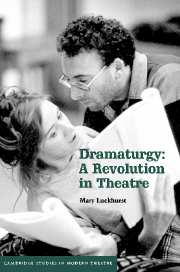Book contents
- Frontmatter
- Contents
- List of illustrations
- Acknowledgements
- List of abbreviations
- 1 Introduction
- 2 Gotthold Lessing and the Hamburg Dramaturgy
- 3 Dramaturgy in nineteenth-century England
- 4 William Archer and Harley Granville Barker: constructions of the literary manager
- 5 Bertolt Brecht: the theory and practice of the dramaturg
- 6 Kenneth Tynan and the National Theatre
- 7 Dramaturgy and literary management in England today
- 8 Conclusion
- Select bibliography
- Index
8 - Conclusion
Published online by Cambridge University Press: 22 September 2009
- Frontmatter
- Contents
- List of illustrations
- Acknowledgements
- List of abbreviations
- 1 Introduction
- 2 Gotthold Lessing and the Hamburg Dramaturgy
- 3 Dramaturgy in nineteenth-century England
- 4 William Archer and Harley Granville Barker: constructions of the literary manager
- 5 Bertolt Brecht: the theory and practice of the dramaturg
- 6 Kenneth Tynan and the National Theatre
- 7 Dramaturgy and literary management in England today
- 8 Conclusion
- Select bibliography
- Index
Summary
Books written against an established academic and intellectual grain, as this one is, make possible many kinds of conclusion. If they succeed in commanding readers and forcing revaluations, they invite correction, application and enlargement by others – and I am sharply aware of how much more can be said, especially in integrating English and particular continental European theatre histories. I equally believe that the methodological framework and the historical outline I propose of English dramaturgical development since Lessing enable that further work; certainly they most clearly inform the answer I can now give to the questions with which I began more than a decade ago, as a theatre-maker in an English province observing something in process and unable to make sense of it.
The meanings of the terms literary manager and dramaturg are relative and determined by the particular cultures and institutions in which individuals operate, but the functions remain. Lessing and Brecht provide the major models, but practice in England is complicated by the fact that variants on these models have also been imported via the US. There is still powerful resistance to the theorisation of literary management and dramaturgy in England (where resistance to theory per se is not limited to theatre). Dramaturgical appointments on the Continent are supported by an ethos that criticism and research are an integral part of artistic creation, but in general the English dislike and resent intellectualising theatre.
- Type
- Chapter
- Information
- DramaturgyA Revolution in Theatre, pp. 263 - 267Publisher: Cambridge University PressPrint publication year: 2006



